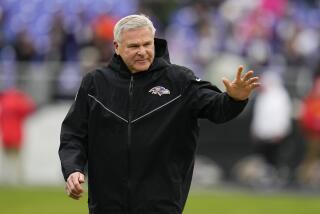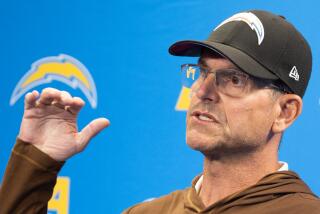Joe Paterno legacy: From triumph to tragedy in days
The death of former Penn State football coach Joe Paterno at age 85 conjures myriad memories and emotions but none more immediately indelible than a snowy day in State College, Pa.
The jubilant scene seems like years ago … it’s actually been less than three months.
Paterno, in his 46th season as head coach, had just earned career win No. 409 with his team’s 10-7 victory over Illinois. It was Oct. 29. The win pushed him ahead of Grambling legend Eddie Robinson as major-college football’s all-time victories leader.
Nursing leg, shoulder and pelvis injuries, Paterno coached from the press box but was toasted in a postgame ceremony. Then-university president Graham Spanier and athletic director Tim Curley presented Paterno with a plaque that read: “Joe Paterno. Educator of Men. Winningest Coach. Division One Football.”
If only time could have stopped, on his legacy, on that last Saturday in October.
But it didn’t, and the rest is a different history.
Less than two weeks after his crowning moment, Paterno was fired in the torrid, horrid middle of one of the worst unfolding scandals in sports history.
Never has 61 years of largely unimpeachable work, in one workplace, with one wife, unraveled so quickly and alarmingly.
The “winningest coach” never got a shot for victory No. 410. The next Saturday, an off weekend, the grand jury investigating the case unveiled a jaw-dropping indictment of former Penn State assistant coach Jerry Sandusky. The child sex abuse charges were salacious, scathing and damning.
Curley, one of the men who handed Paterno his plaque, faced charges of failing to report allegations of criminal conduct as well as perjury and saw his Penn State career abruptly end. Spanier was ousted as president.
Paterno, the most powerful man in town for more than four decades, was left to unsuccessfully bargain for the last few weeks of his brilliant career.
It didn’t work.
This was worse than a horror movie: It was “Plan 9 From Outer Space.”
So this, really, is how it ends?
Paterno’s death leaves open wounds and unanswered questions. He was never implicated directly in the scandal but had to stand in judgment against himself — the high man of character he had proved to be since arriving on campus in 1950.
The bottom line in this scandal is now the forever nagging gray area: Mike McQueary, a former Penn State quarterback and graduate assistant, had told Paterno in 2002 that he saw Sandusky molest a young boy in the locker room showers.
Paterno did what was legally required: He reported the alleged incident to his superior. And this is where the story disconnected from anything we would have imagined.
Paterno had built an empire on integrity, accountability and doing things the right way. He called it his Grand Experiment, the idea you could win big without sacrificing ethics or dignity.
Everyone, including Paterno, seemed to agree: He should have done more.
So why didn’t he?
The end came quickly. As the story played out, Paterno learned he had lung cancer. Penn State started cleaning house by naming a new coach, New England Patriots assistant Bill O’Brien, with no ties to the program.
And now, with Paterno’s death, we’re left with sadness, admiration, reflection, head scratching and gaps to fill.
How did a man of such greatness over time fall so short, so fast?
Paterno, as he neared the end of his life, tried to add context.
Recently, he sat down with Sally Jenkins of the Washington Post and explained his reaction to McQueary’s shocking disclosure.
“I didn’t know exactly how to handle it,” Paterno said. “And I was afraid to do something that might jeopardize what the university procedure was. So I backed away and turned it over to some other people, people I thought would have a little more expertise than I did. It didn’t work out that way.”
Paterno seemed to be suggesting that a man of his generation might not have understood exactly what McQueary was talking about.
“You know,” Paterno told the Post, “he didn’t want to get specific. And to be frank with you I don’t know that it would have done any good, because I never heard of, of, rape and a man. So I just did what I thought was best. I talked to people I thought would be, if there was a problem, that would be following up on it.”
Paterno said, “I had never had to deal with something like that. And I didn’t feel adequate.”
Unfortunately, Paterno’s explanation, for a man of his ilk, seemed to many inadequate. It did not explain how Paterno would continue to provide Sandusky access to facilities.
How was the story allowed to fester nine years after the 2002 incident?
Ignorance, ultimately, cannot be an excuse for doing only what was legally required.
Paterno made a life of going above and beyond. He loved the quote that a “man’s reach should exceed his grasp.”
Frankly, everything that’s happened in the last three months has been tough to grasp — right up to the end.
There was confusion in Paterno’s final hours, even an erroneous report of his death as family members were called to his bedside.
“Dad is alive but in serious condition,” Scott Paterno tweeted Saturday evening.
This isn’t the way it was supposed to end, it was just the way it did.
Paterno’s explanation to the Post, sadly, will be his last words of rebuttal.
Weeks after triumphant career win No. 409, on that snowy October day, Paterno exits the world with a coaching legacy worthy of wonderment.
And questions that may never be adequately answered.
More to Read
Go beyond the scoreboard
Get the latest on L.A.'s teams in the daily Sports Report newsletter.
You may occasionally receive promotional content from the Los Angeles Times.











